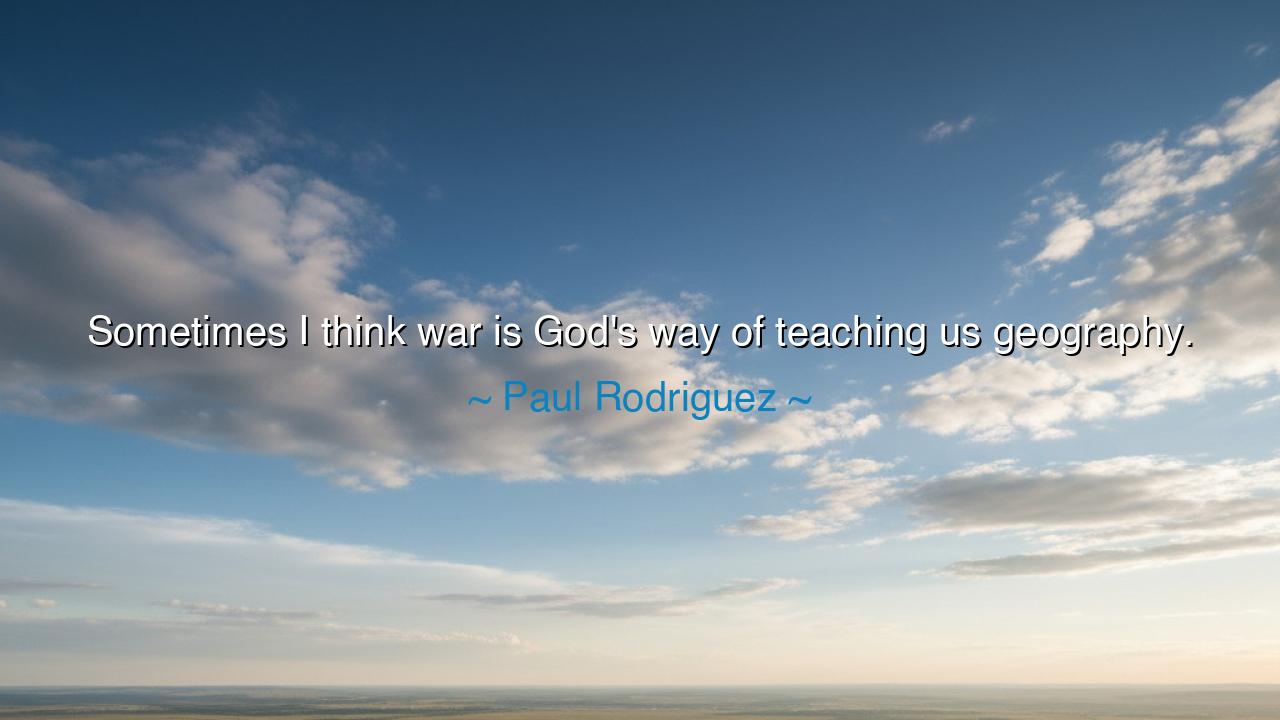
Sometimes I think war is God's way of teaching us geography.






Hear, O seeker of wisdom, the curious words of Paul Rodriguez: “Sometimes I think war is God’s way of teaching us geography.” Though spoken with humor, this saying carries a grave undertone. It speaks of the strange irony that men often ignore the lands of others until blood is spilled upon them. Only when the drums of war sound do distant valleys, rivers, and cities become known. The map, once a blur, becomes etched in memory, but not through study, rather through sorrow. Thus Rodriguez, in jest, uncovers a truth of mankind’s negligence: we learn the world not by peace, but by conflict.
The origin of this thought is seen in every generation. Few Americans knew the hills of Korea before the Korean War; few Europeans could find Kuwait on a map before the Gulf War. Yet when armies marched and battles raged, those places became etched into the consciousness of nations. War, like a cruel teacher, forces knowledge upon the unwilling. Geography becomes no longer lines and names, but fields of fire, cities under siege, and lands remembered through loss. War is the teacher, geography the lesson, but the tuition is paid in blood.
Consider the example of Vietnam. Before the 1960s, to many in the West it was a name distant and vague. Yet when war consumed it, the world learned of the Mekong Delta, of Hanoi, of Da Nang. These names became not merely points on a map, but places bound to sacrifice, controversy, and memory. Students learned geography not from the stillness of the classroom, but from the thunder of helicopters and the nightly images broadcast on their screens. Rodriguez’s jest thus reveals a bitter truth: conflict awakens awareness, but it does so at the highest of costs.
History repeats this lesson in every great conflict. The First World War taught men the geography of Flanders, of the Marne, of Gallipoli. The Second World War carved into memory the names of Normandy, Stalingrad, and Iwo Jima. Each war rewrote the mental map of nations, forcing them to know places they might never have cared for, except that lives were spent there. Thus war becomes a brutal instructor, driving knowledge into the mind as a branding iron into flesh. Geography learned through war is knowledge stained with grief.
But what shall we take from this teaching? That we must not wait for war to learn the world. We must not leave it to violence to expand our vision. Better to learn in peace what war teaches in pain. Let the rivers and mountains of foreign lands be known to us through study, travel, and compassion, not through dispatches of death. Let us see nations as living homes for peoples, not as lines to be fought over. If war is God’s way of teaching us geography, then let us prove Him wrong by learning through gentler means.
Therefore, O listener, take this counsel: open your eyes to the world before tragedy forces them open. Learn the lands of others, respect their cultures, know their histories, and honor their names. Let your heart travel beyond your borders in friendship, so that no soldier need travel there in battle. For Rodriguez’s words, though wrapped in humor, are also a warning—that ignorance breeds war, but knowledge nurtures peace.
So remember: do not let war be your teacher. Let books, journeys, friendships, and compassion be your guides. Learn geography not through destruction, but through understanding. In this way, you honor the truth of the quote, and yet turn its sorrow into wisdom.






HPDo Nguyen Hoang Phuc
It's interesting how the idea of war can lead to a warped form of education. While geography is meant to be a tool for understanding the world, war distorts it into something different — something tied to power, conflict, and control. If geography is indeed taught this way, what does that tell us about the real cost of human conflict? Should we not question the ethics of learning through destruction?
KLkhanhh lyyy
This quote has a jarring humor to it, but it’s unsettling when you think about it. War, which should be seen as an unfortunate last resort, seems to teach us about places, borders, and histories in a way no peaceful education ever would. What does it say about the state of the world that our most significant geographic knowledge sometimes comes from conflict instead of collaboration or peaceful exploration?
CMTrang cong manh
It’s a thought-provoking line that may make us question the cost of learning in a world shaped by violence. While this quote could be viewed as cynical humor, it raises an uncomfortable truth: war often forces people to see the world differently, especially through the lens of territorial disputes. How often do we end up ‘discovering’ new places or concepts because of war? Is that the kind of geography we want to focus on?
GDGold D.dragon
I get the irony in this statement, but it also brings up a serious question: How often do we truly consider the consequences of war beyond its immediate effects? Geography, in this context, becomes a backdrop to human suffering and conflict. Does this mean we only learn through loss and destruction? Shouldn't we try to learn about the world in more peaceful ways? Or is it too naive to expect that?
PTChi Pham Tu
While this might sound like a sarcastic remark, there’s something unsettling about it. Why must we learn about the world through war? Is this the best way for humanity to expand its understanding? Shouldn’t we prioritize peace and cooperation to explore geography rather than fighting over land and resources? Perhaps there’s a more profound message about the tragedies of war and its impact on education and perception.